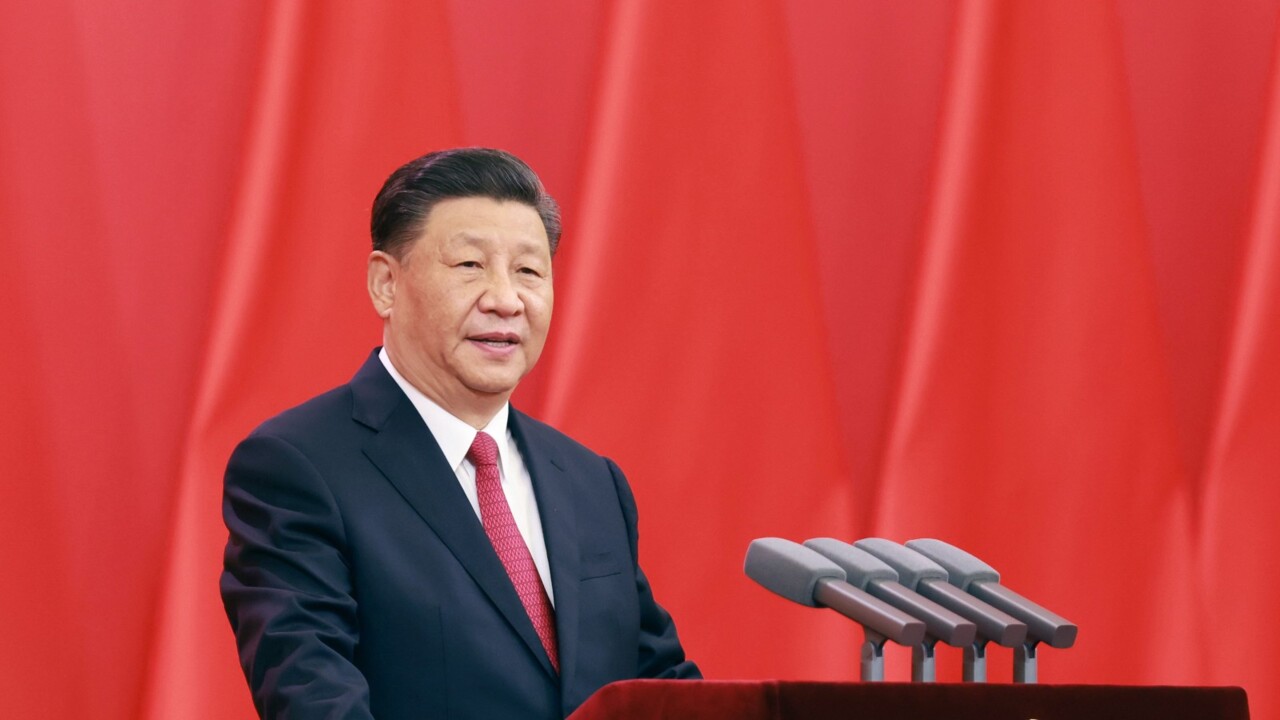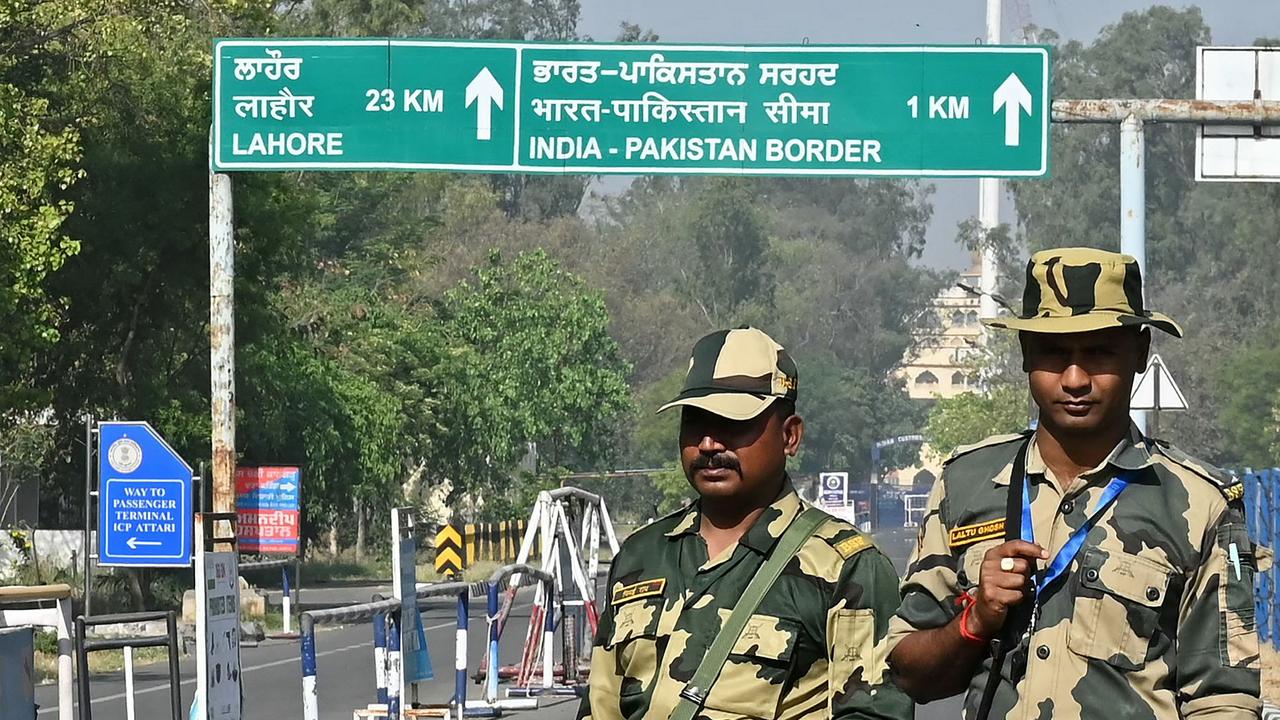Xi Jinping delivers ominous speech at the Chinese Communist Party’s 20th National Congress
Chinese leader Xi Jinping has made a hidden threat in an ominous speech over China’s “crucial” plan for the next five years.

He sipped at tea. He drank lots of water. The 69-year-old cut his planned three-hour speech down to two. Xi Jinping gave the same speech he‘s been giving for years – everything is perfect.
And you’d dare not disagree.
Xi’s not being humble.
But we’ve heard it all before.
Strengthening the military. Great challenges ahead. Fighting to win. Warning foreigners not to interfere. Taiwan is mine.
The state-controlled People’s Daily declared that “in the ten years of the new era, the Chinese nation has ushered in a great leap from standing up and becoming rich to becoming strong”.
“Realisation of the great rejuvenation of the Chinese nation has entered an irreversible historical process. China has made great contributions to the peaceful development of mankind.”
That was the essence of the “Work Report” General Secretary Xi Jinping issued to his 2300 hand-picked delegates attending the Chinese Communist Party’s 20th National Congress overnight.
It was just the first session of the marathon week-long spectacle.
“The next five years will be crucial,” Xi told the Great Hall of the People in Tiananmen Square.
He mentioned nothing about standing down after 10 years in office.
The Congress’s main job is to install the Communist Party’s leadership team for the next five years.
It used to be unconstitutional for anyone to seek a third term of office.
But, in 2018, Xi had the limit on his presidency removed. Now, Communist Party Officials have declared Xi will be allowed to stay “if” he is “needed” to carry out “reforms”.
Just to make sure, an additional motion will likely be placed before the 2300 this week to amend Xi’s status to “Great Leader” – a recognition of the entrenchment of “Xi Jinping Thought” at the heart of Chinese ideology.
“Today, the consensus is stronger: China can, and the key lies in the Communist Party of China’s ability! The incomparably strong leadership of the Communist Party of China is the most reliable backbone of the Chinese people!” The People’s Daily declared.
The Taiwan question
Xi’s moment of greatest applause came when he declared: “The wheels of history are rolling on toward China’s reunification and the rejuvenation of the Chinese nation. Complete reunification of our country must be realised, and it can, without doubt, be realised.”
Xi once again reserved the right of the CCP to use force to assimilate democratic Taiwan.
“We will continue to strive for peaceful reunification,” he said. “But we will never promise to renounce the use of force. And we reserve the option of taking all measures necessary.”
He defended the brutal crackdown on pro-democracy movements in Hong Kong, declaring the former British colony had entered “a new stage in which it has restored order and is set to thrive.”
But analysts noted Xi left out some critical components of the written version of his speech in his shortened oral address.
He wrote resolute opposition to “Taiwan independence” and “foreign interference” had allowed China to “maintain the initiative and the ability to steer cross-Strait relations”.
He repeated that “resolving the Taiwan question and realising China‘s complete reunification is a historic mission and an unshakeable commitment.”
He insisted reunification is “a natural requirement for realising the rejuvenation of the Chinese nation.”
“That sentence has been interpreted by some observers as a ‘deadline’, i.e. that reunification must be achieved by 2049, the target date for national rejuvenation,” says German Marshall Fund Asia Program director Bonnie Glaser.
“In my view, this is all consistent with new White Paper and Xi Jinping’s January 2, 2019 speech. There is no new signal of greater urgency than we have seen in the past. Somewhat greater emphasis on warning foreigners to not interfere, perhaps.”
Great power competition
China is engaged in increasingly hostile territorial standoffs with India, South Korea, Japan, Taiwan, the Philippines, Vietnam, Malaysia, and Indonesia.
And yet, Xi declared his foreign policy principles respect other countries‘ sovereignty and independence. He insisted he was opposed to “hegemonism and power politics, the Cold War mentality” and “double standards”.
He then went on to detail how China would engage in Cold War.
“We will work faster to modernise military theory, personnel and weapons,” Xi told his stony-faced audience. ”We will enhance the military‘s strategic capabilities.”
The People‘s Liberation Army (PLA) is no regular army.
Instead, it is the militarised wing of the Chinese Communist Party (CCP).
Exactly what China‘s military budget is remains unknown. It admits to a figure that puts it at the world’s number two slot – but significantly behind that of the United States. But its “civil-military fusion” policy means much of the money can be buried among the books.
Xi made no mention of his “best friend” President Vladimir Putin invading Ukraine. Even though the spectacular failure of his forces to seize the territory has severe implications for China‘s designs over Taiwan.
But his tone remained forceful.
“We will safeguard the overall interests of the Chinese nation and take resolute steps to oppose ‘Taiwan independence’ and promote reunification,” he said.
It‘s become something of a mantra. But Xi once again insisted this was a historical opportunity for China to raise its standing and influence worldwide. That was why the CCP must foster “purpose, fortitude and self-belief … so that we cannot be swayed by fallacies, deterred by intimidation or cowed by pressure.”
Brookings Institution think-tank analyst Derek Grossman took a grim message from Xi‘s words: “My top impression from 20th Party Congress is Xi’s China is everything we’ve worried about,” he said. ”It’s a revisionist power that firmly believes it will ultimately prevail in strategic competition against America. We better get our own house in order and prepare.”
‘Loveable image of China’
Xi was keen to set the world‘s opinion of his regime right.
He wants to “accelerate the development of Chinese discourse and narrative systems, effectively communicate the voice of China, and portray a credible, loveable, and respectable image of China.”
Doing so involves “improving our ability to communicate internationally”.
That may be why the word ‘democracy“ appears more than 40 times in his speech.
If we are to believe Xi, the Chinese Communist Party is the world‘s most democratic institution.
He said that the CCP‘s version of democracy is “broader” and more ”representative” than any other.
But the word doesn‘t appear to mean what he thinks it does.
Shocking video spreading on HK Telegram channels showing someone from the PRC Consulate in Manchester kicking down pro-democracy signs.
— Luke M (@McWLuke) October 16, 2022
A protestor then appears to have been dragged behind the Consulate gates and beaten by consulate staff. pic.twitter.com/tntvTz38DY
Chinese social media at the weekend banned the keyword “Beijing” and shut down accounts that reposted pictures of a banner on a bridge in the capital calling Xi a ”tyrant”. And the Chinese Consul General for the British city of Manchester physically assaulted a Hong Kong pro-democracy demonstrator and tore down his pro-democracy placards.
Xi spoke of the “principle of letting a hundred flowers bloom and a hundred schools of thought contend”.
In the next breath, he declared, “we will firmly grasp the Party‘s leadership over ideological work, fully implement the Ideological Work Responsibility System, and consolidate and strengthen what serves as the mainstream ideology and public opinion.”
To do this, Xi said China must “cultivate” philosophy and social sciences under a ”whole-of-media communication system approach”. This new framework would ”shape mainstream public opinion, boost the development of a healthy online environment and strengthen the comprehensive system of online government”.
But Xi‘s speech was mostly about building national pride.
“We shall boost our cultural self-confidence, rally the people around the flag, win their hearts, educate the New Man, and rejuvenate our culture,” he said, ”to bring about the great rejuvenation of the Chinese nation, encourage cultural innovation and creativity across the board, and boost our spiritual power.”
The future, Xi said, belongs to China:
“At present, momentous changes of a like not seen in a century are accelerating across the world. A new round of scientific and technological revolution and industrial transformation is well underway, and a significant shift is taking place in the international balance of power, presenting China with strategic opportunities in pursuing development.”




